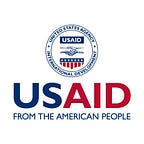USAID Local Expertise Integral to Food Security
Around the world, USAID works to help communities to take charge of their own development. Our work depends on committed and experienced foreign service nationals (FSNs) — highly-qualified, local, non-U.S. citizens — to help bridge the gap between policy from Washington and the context of the countries we work in. Without the local expertise, languages, and passion that FSNs bring to USAID, our engagement with the people whose lives we aim to improve would fall well short. In Zimbabwe, USAID’s Office of Food for Peace (FFP) is fortunate to have an all-star staff of foreign service nationals.
Knowing What Works for Food Security
Erina Machoko, a Food Security and Livelihood Specialist, worked for non-governmental organizations implementing humanitarian assistance and resilience-building activities similar to the ones she monitors with USAID today. Because of this on-the-ground experience with implementing partners, Erina states, “I know what is possible — and not possible — to achieve, because I’ve been there before.” Erina has been working with USAID on a monitoring toolkit for food-for-assets activities in rural Zimbabwe. Through these activities, households in food insecure areas receive assistance in meeting basic household food and nutrition needs in exchange for a healthy household member helping to create or rehabilitate community assets, such as dams and gardens, which support resilience from recurrent shocks. “This has a huge impact on the food security situation simply because they are able to build community from the assets they are creating,” Erina says.
Talking the Talk with Nutrition
At USAID, our work by its very nature deals with people in trying times, facing troublesome circumstances; connecting and communicating with those people in need is crucial to helping them. Themba Nduna, a nutrition advisor who’s been with USAID for five years, speaks both Shona and Ndebele — the two primary languages in Zimbabwe other than English. “You find my interactions with beneficiaries are very fun and exciting, but also very informative and challenging because I can deploy all my language skills and my understanding of culture to drive a point across. This is different in a foreign country because you almost always rely on English as a medium and have people interpreting for you and you can’t drive the point as much as you want.” To Themba, the importance of language goes beyond Shona or English; being fluent in the language of nutrition brings immense value to the team. “Whatever the programs are doing, at the end of the day, we are going to measure ourselves in nutrition terms, whether they are doing village savings and loans, agriculture, gender, whatever piece they’re doing within the program, we understand how it contributes to nutrition as an outcome.”
Driving Change through Learning
Justin Mupeyiwa, now in his eighth year with USAID, currently focuses on assessments, monitoring and evaluation, and learning. Justin, who came from a background of emergency food assistance, is currently focusing on how our development partners in Zimbabwe can improve the lives of the poorest of the poor. “When I was implementing, because of my passion for the communities, I liked my work with the communities, but I like working for USAID because I can influence what happens. I wanted to move to USAID, because knowing what the country needs and coming from a rural area, an area that was a potential recipient area, I know the challenges and wanted to be here where I can inform how the programs are being designed, which I think meaningfully changes people’s lives. That’s my main drive for being here.”
As an FSN, Justin has had an opportunity to shape how USAID helps to increase resilience and strengthen food security in his own country. Through his career, his experience and expertise has grown, but so has his passion. “I want to continue shaping, maybe beyond Zimbabwe, shaping maybe Southern Africa, how things are done and how the programs are implemented and how they’re designed. That’s my personal vision.”
USAID is extremely lucky to have such passionate and driven foreign staff who work tirelessly to better the situation and circumstances of their communities. The second Wednesday in November is USAID’s FSN Day, but every day is a day to thank and celebrate those who work with us to help their own countries on the path to self-reliance. Food for Peace would not have been able to program over $3.5 billion in Fiscal Year 2018 alone, were it not for a strong network of FSNs to ensure that we’re reaching those who need it most. So, thank you; we are proud to have you in the USAID family.
